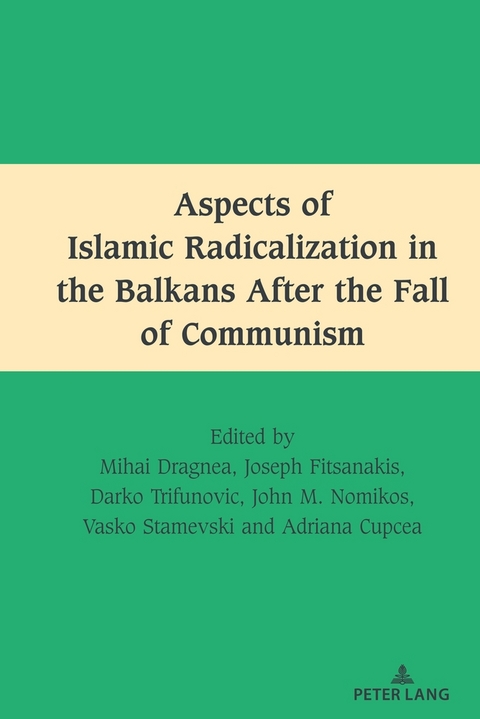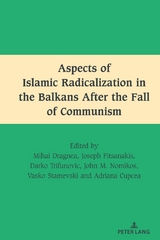Aspects of Islamic Radicalization in the Balkans After the Fall of Communism
Peter Lang Publishing Inc (Verlag)
978-1-4331-9868-7 (ISBN)
Cumulatively these essays emphasize the risks to national security in the Western Balkans represented by the return of Islamic State fighters and the spread of so-called jihadist-Salafism within Muslim communities. The volume is intended to help the reader understand the Balkan states’ foreign policy as a response towards the Muslim world in the context of the global war against terrorism. It is the outcome of a research project of the Balkan History Association.
"This volume shows that Muslim communities in the Western Balkans face intense propaganda from radical Islam and the incitement of hatred and interreligious divisions, aiming to indoctrinate moderate and tolerant Balkan Muslims. Kosovar youth, for instance, are exposed to a radical ideology which, under the influence of imams trained in fundamentalist madrassas in the Middle East, aims to create a new kind of Muslim, one who is ignorant of the past, of national identity and the values of democracy, and who is concerned only with 'Islamic' values propagated through Salafism."
—Kolë Krasniqi, University "Haxhi Zeka" in Peja, Kosovo
"Although Islam has historically been a socio-cultural pillar of Southeast European societies, the recent turmoil and failed revolutions across the Muslim world have influenced sections of Muslim communities in the region. This excellent collected volume is a much-needed attempt to trace the subtle workings of re-Islamisation and changes in traditional Muslim identities under the influence of foreign forms of Islam. All chapters show remarkable scholarly achievement and the fruitfulness of pursuing interdisciplinary perspectives on the development of Balkan Muslims communities since 1989."
—Francesco Trupia, Nicolaus Copernicus University, Poland
Mihai Dragnea, PhD, is an associate researcher at the University of South-Eastern Norway and president of the Balkan History Association. Joseph Fitsanakis, PhD, is Professor of Intelligence and Security Studies at Coastal Carolina University in the United States, where he also serves as Director of the University’s Intelligence Operations Command Center. Darko Trifunovic, PhD, is a founding member and Director of the Institute for National and International Security in Belgrade, Serbia, and a Senior Advisor at the Research Institute for European and American Studies in Athens. John Nomikos, PhD, is Director of the Research Institute for European and American Studies in Athens, Chairman at the European Intelligence Academy and Assistant Professor at Webster University (Athens Campus). Vasko Stamevski, PhD, is full Professor at the Faculty of Law of the International Slavic University "Gavrilo Romanovich Derzhavin" in St. Nikole, North Macedonnia, and Vice-Rector for International Cooperation. Adriana Cupcea, PhD, is a researcher in the Romanian Institute for Research on National Minorities, Cluj-Napoca, Romania.
Preface – Mihai Dragnea: Introduction: Post-communist Encounters in Islamic Faith and Security in the Balkans – Joseph Coelho: Constructing a New Threat: The Securitization of Islam in Postwar Kosovo – Henrique Schneider: Islamic Radicalization in Kosovo: A Case in Multi-layered Identity – Gianfranco Bria: Salafism in Albania between Deculturation and Post-socialist Legacy – Iris Luarasi: Mainstream and Online Media, a Useful Tool on Fighting Violent Extremism in Albania – Marko Savić/Almedina Vukić Martinović: Building a Community Resilient to the Islamic Radicalism: A Case Study of the Muslim Community in Montenegro – Bogdana Todorova: Risks for Islamic Fundamentalism and Radicalism after the Fall of Communism in Bulgaria – Cornel Andrei Crișan: Missionary Islamic NGOs in Romania: Da’wah Materials Disseminated among Muslims in Romania – Mijo Beljo and Lucija Zadro: Mujahideen in Bosnia and Herzegovina from 1992 until 1995 165 – Michalis Marioras: Foreign Fighters and Global Jihad in the Balkans: The Case of Bosnia and Herzegovina – Zhidas Daskalovski: Factors That Moderate Islamic Radicalization in North Macedonia – Darko Trifunović: “Islamic Terrorism” in the Serbian Sandžak under Salafi Influence – Klemen Kocjančič: Beyond the Balkans: Islamist Terrorism in Europe with Balkan Connections – John Nomikos/Joseph Fitsanakis: Conclusion: The Trajectory of Islamist Militancy in the Balkans – Editors and Authors – Index.
"This volume shows that the Muslim communities in the Western Balkans are facing an intense propaganda of a radical Islam and the incitement of hatred and various interreligious divisions, aiming to indoctrinate moderate and tolerant Balkan Muslims. Kosovar youth, for instance, are threatened with a very radical ideology that according to the Kosovar imams trained in different fundamentalist madrassas in the Middle East, 'should influence the creation of a type of the new Muslim believer,' who does not know its historical past, nor its national identity or the values of democracy, but only the 'Islamic' values propagated through Salafism."
—Kolë Krasniqi, University “Haxhi Zeka” in Peja, Kosovo
"Although Islam has historically been a socio-cultural pillar of the Southeast European societies, the latest turmoil and failed revolutions across the Muslim world have influenced some segments of Muslim communities within the same region. This excellent collective volume is a much-needed contribution to tracing out the inconspicuous phenomena of re-Islamisation and looking at the changes in traditional Muslim identities vis-à-vis interpenetrations of foreign forms of Islam. All chapters show remarkable scholarly achievements and the fruitfulness of providing interdisciplinary perspectives on the development of Balkan Muslims after 1989, thereby shedding new light on the future policy challenges and security issues for the region and the whole European continent."
—Francesco Trupia, Nicolaus Copernicus University, Poland
| Erscheinungsdatum | 20.02.2023 |
|---|---|
| Reihe/Serie | South-East European History ; 2 |
| Mitarbeit |
Herausgeber (Serie): Mihai Dragnea |
| Zusatzinfo | 30 Illustrations |
| Verlagsort | New York |
| Sprache | englisch |
| Maße | 150 x 225 mm |
| Gewicht | 493 g |
| Themenwelt | Geschichte ► Teilgebiete der Geschichte ► Kulturgeschichte |
| Geschichte ► Teilgebiete der Geschichte ► Sozialgeschichte | |
| Geisteswissenschaften ► Religion / Theologie ► Islam | |
| Schlagworte | Adriana Cupcea • Anti-secularism • Aspects of Islamic Radicalization in the Balkans After the Fall of Communism • Balkans • Darko Trifunovic • Fundamentalism • Islamic faith • Islamic radicalization • Islamic Studies • Islamism • Jihadism • John M. Nomikos • Joseph Fitsanakis • Mihai Dragnea • organized violence • Post-Communism • Salafism • security studies • terrorism • Vasko Stamevski • Wahhabism |
| ISBN-10 | 1-4331-9868-1 / 1433198681 |
| ISBN-13 | 978-1-4331-9868-7 / 9781433198687 |
| Zustand | Neuware |
| Haben Sie eine Frage zum Produkt? |
aus dem Bereich




